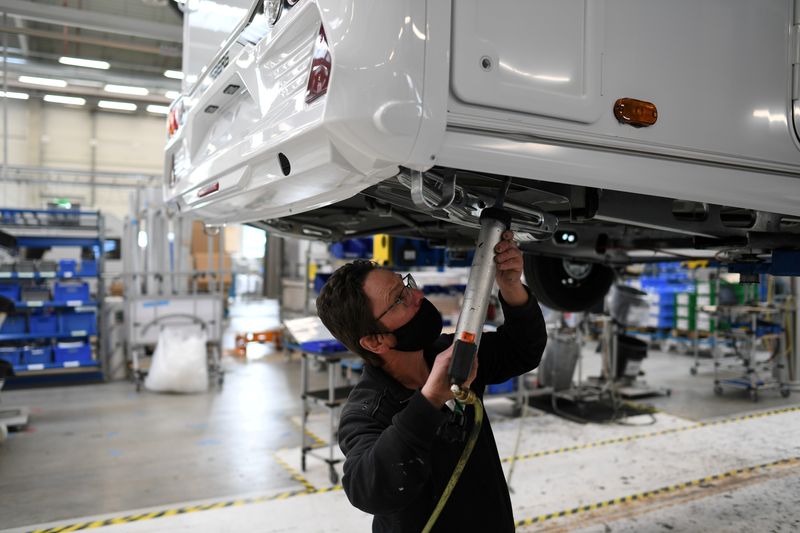Decline in euro zone business activity accelerated in July
2023.08.03 06:41

© Reuters. FILE PHOTO: A worker assembles a vehicle at the Knaus-Tabbert AG factory in Jandelsbrunn near Passau, Germany, March 16, 2021. Picture taken March 16, 2021. REUTERS/Andreas Gebert/File Photo
By Jonathan Cable
LONDON (Reuters) -The downturn in euro zone business activity worsened more than initially thought in July as the slump in manufacturing was accompanied by a further slowing of growth in the bloc’s dominant services industry, a survey showed.
HCOB’s final Composite Purchasing Managers’ Index (PMI), compiled by S&P Global (NYSE:) and seen as a good gauge of overall economic health, dropped to an eight-month low of 48.6 in July from June’s 49.9.
That was below the 50 mark separating growth from contraction for a second straight month and shy of a preliminary estimate for 48.9.
“The final euro zone PMIs confirmed that economic conditions deteriorated in July, with the composite index consistent with GDP declining slightly,” said Franziska Palmas, senior Europe economist at Capital Economics.
Tuesday’s manufacturing PMI showed factory activity across the euro zone contracted in July at the fastest pace since COVID-19 was cementing its grip on the world and Wednesday’s services PMI showed slowing growth in the industry.
The headline services index fell to 50.9 from 52.0, coming in under the preliminary 51.1 reading.
Indicating there is a little chance of a turnaround anytime soon, demand for services fell for the first time this year as indebted consumers felt the pinch from higher borrowing costs and prices.
“Forward looking indicators were downbeat, with falls in both the services new business index and the manufacturing new orders index,” Palmas added.
Still, policymakers at the European Central Bank will likely take some cheer from further signs of easing price pressures. Both the composite input and output prices index fell last month with the one monitoring charges levied on customers down to its lowest since early 2021.
Inflation has remained stubbornly high in the bloc despite aggressive tightening of monetary policy.
The ECB raised interest rates for the ninth consecutive time last week but raised the possibility of a pause in September as inflation pressures show tentative signs of easing and recession worries mount.








